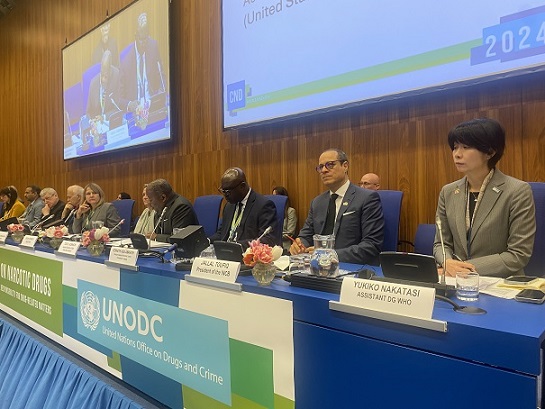Statement by Prof. Jallal Toufiq, President,
International Narcotics Control Board (INCB)
Sixty-seventh session of the Commission on Narcotic Drugs
High-level segment Round table (ii)
The way forward: the road to 2029
15 March 2024, Vienna, Austria

Mr. Chair, Madam Chair, distinguished Ministers, Excellencies, fellow panellists, Ladies and Gentlemen,
It is an honour to participate in this round table as President of the International Narcotics Control Board.
INCB's written contribution to the mid-term review maps out a way forward to address the drug control challenges identified in the 2019 Ministerial Declaration, aimed at advancing effective drug control policy and action in two areas:
- firstly, to promote the availability of controlled substances for medical, scientific and industrial purposes while preventing diversion to illicit channels; and
- secondly, to adopt health- and evidence-based drug policies that consider the specific needs of populations, respect human rights and provide for proportional responses to drug-related criminality that respect due process.
There is an urgent need to improve the availability of narcotic drugs and psychotropic substances for medical purposes, including during emergencies. This requires targeted policies developed and implemented by Governments in partnership with health professionals, civil society, the pharmaceutical industry and the international community.
Governments are urged to report accurate data to INCB on licit cultivation, production, manufacture, consumption and international trade, as well as on seizures of precursors and precursor chemicals. National monitoring mechanisms need to be strengthened. This includes improving national data-collection systems, training staff, enhancing inter-agency cooperation and cooperation with the private sector. INCB encourages donors to include data collection and analysis in their assistance programmes. Governments are encouraged to participate in INCB Learning capacity building activities, in particular to improve the accuracy of estimated national requirements for licit purposes, and to support the continued operation of INCB Learning.
Additionally, when considering learning, Governments that have not yet done so need to introduce mandatory training on pain and palliative care management in the curricula of medial and nursing schools.
There is a need for comprehensive and linked-up knowledge networks to address both supply and demand factors, especially on drug production, trafficking and misuse, as well as on prevention and treatment services. This is increasingly required in view of expanding trafficking in and use of cocaine and the proliferation of new psychoactive substances and highly potent non-medical synthetic opioids, and their devastating impact on public health.
There is a need to build capacity and operational knowledge to prevent the diversion of chemicals to illicit drug manufacture, and to strengthen precursor monitoring systems. Timely implementation of CND's scheduling decisions is critically important for effective global precursor control.
Governments should make greater use of INCB's Limited International Special Surveillance List of non-scheduled substances and the list of substances not under international control but under national control in some countries. INCB recommends the full use of its guidelines to ensure appropriate responses to the diversion of materials and equipment.
Stopped shipments should be treated as the starting point of investigations to identify traffickers and new modus operandi, including backtracking. Governments are encouraged to utilize the global cooperation mechanisms under Projects Prism and Cohesion to exchange information on new precursor trafficking trends.
Governments are also urged to actively use INCB's PEN Online, PEN Online Light, and PICS, already cited by His Excellency Mr. Robinson, to prevent diversion of and investigate trafficking incidents involving internationally controlled precursors, non-scheduled chemicals and illicit-drug manufacturing equipment.. Governments are also encouraged to map their national industry landscapes as a first step towards engagement with industries in self-protective, proactive strategies aimed at reducing opportunities for infiltration by traffickers.
Excellencies, ladies and gentlemen,
Considering the evolving threat posed by new psychoactive substances, non-medical synthetic opioids, and related dangerous substances, INCB also encourages Governments to participate in the INCB GRIDS Programme activities including use of its IONICS system, as well as the GRIDS Intelligence HD strategic and operational targeting platforms, ELITE, and the Scanning of Novel Opioids on Online Platforms tool, known as SNOOP, for detection and dismantling of online vendor marketplaces.
INCB is facilitating public-private partnerships between governments and industries vulnerable to misuse for trafficking, including industries related to manufacture, marketing, movement and monetization. INCB encourages use of the practical guidelines developed under its precursor control and GRIDS programmes to promote voluntary cooperation with the chemical, express courier, freight forwarding and e-commerce industries and internet-related services.
Governments are encouraged to use the INCB OPIOIDS Project's fentanyl-related substances list and the Project's other lists of dangerous substances to encourage industry partners to voluntarily limit their activities on these substances to research and analysis.
At the same time, INCB encourages Governments to harness the potential of the Internet and social media to broaden the reach of prevention and treatment services.
Drug control policies must be designed and implemented in accordance with international human rights instruments, the drug control conventions and the rule of law, as well as the principle of proportionality.
INCB strongly advocates for the implementation of data and evidence-based policies and programmes to prevent and treat drug use disorders, that follow the UNODC and WHO International Standards for the Treatment of Drug Use Disorders. Preventing and addressing stigma and discrimination is essential.
Finally, action in these areas is needed to address the drug control challenges faced today. Improved resource allocation, data sharing and public-private partnerships have a key role to play. A good legal framework should put the person at the centre of our policies, which is essential to safeguarding health and welfare for the years ahead.
Thank you.
*****